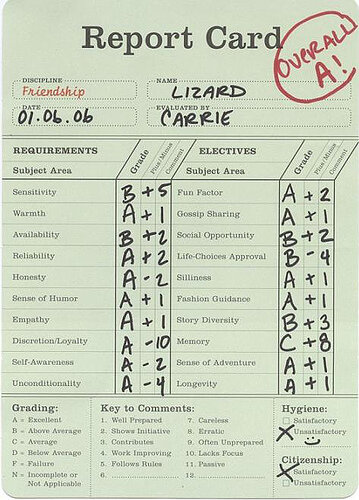Resolve to Ask Current Clients More
If you're a lawyer who only surveys your clients once the engagement's over, you're leaving a lot of information on the table -- information that will not only help you serve future clients, but your current ones as well.
That's why, in 2010, you should Resolve To Ask Current Clients More. Institute a regular, ongoing client survey process that reaches out to your current clients at least quarterly.
But what kinds of questions should you ask? I've put together the LexThink Model Client Survey (pdf) that contains four short questions for your current clients.
The questions are:
1. On a scale of 1 - 10 (with 10 being best), how well are you being served by this firm, our lawyers and staff.
How could we earn a higher score from you?
2. On a scale of 1 - 10 (with 10 being most likely), how likely you are to recommend us to your peers?
When you describe us to your peers (if you do), what are some of the words you use?
3. What one change could we make to our firm to earn more business from you?
4. What is your most pressing challenge (business, legal or otherwise) you’d like to overcome in the upcoming year?
Resolve to Do One Big Thing
If you asked your clients identify the biggest change you've made in your business in 2009, what would their answer be? Would they be able to name anything (besides your rate) that you've done differently in the past 12 months? Would you?
For 2010, I challenge you to resolve to make a change in your business your clients can't help noticing. Not sure what to change? Ask them.
Send each client a letter the first week of 2010 that says:
Dear client,
As the New Year arrives, we are grateful for the opportunity to continue to serve you. For 2010, we're resolving to serve you better. That's why we're asking all our clients the following question:
If you could make one change in our business, what would it be?
Nothing's off the table. If you think we need to charge differently, stay open longer, use different technology, or even answer the phone faster, let us know. We're committed to making our business better for your business.
We'll collect the answers, and post them in our office for everyone to see. On January 31, we'll choose (at least) one to implement in 2010. Of course, we'll keep you up to date on our progress, and may ask you for some help in getting everything "just right."
Thanks again for being our client -- and for helping us to become the law firm you deserve!
Once all the responses are in, consider hosting a "Resolution Party" to sort through and prioritize the responses with your clients. And don't forget to ask them for their resolutions for their own businesses -- you may just find a few things you can help them with, too.
Resolve to Let Your Clients Grade You
Once you've asked your clients what they expect from you, let them grade you on it. Here's how:
- Make a list of 3-5 non-negotiable "Client Commitments" that you and your firm promise to keep in every matter with every client.
- Share those Commitments on your website and in every engagement agreement.
- With every bill (or at least quarterly), send your clients an old-fashioned "Report Card" that asks them to give you a grade on each of your Client Commitments.
- Follow up with the client each time you get a B or below to find out about specific ways you can improve.
- At least yearly, schedule a "parent-teacher" conference to review your performance with the client.
- Consider refunding part of your fees every time a client gives you a C or D -- and think seriously about giving a client's entire fee back (and helping them find another lawyer) when they've "failed" you, because you've probably failed them
Resolve to Measure What Your Clients Treasure
I doubt that if you asked your clients what they buy from you that they'd answer, "Time." Yet because (many of) you sell time to them, it is often the only thing that you measure with any rigor.
In 2010, Resolve to Measure What Your Clients Treasure. Start by asking every client this question:
"How will you measure your satisfaction with us as we serve you?"
Don't settle for an answer that depends completely on the end result. Instead, press for answers like "By always keeping me up to date," and "Returning my phone calls promptly."
Once you've identified at least two things most of your clients want from you, begin to measure how well you're doing them. Your clients already are.
Resolve to Know Your Best Clients Better

Now that you've identified your worst clients, fired them, and stopped taking more like them, you can now focus your time and energy on building your practice doing the kinds of things you like to do for clients that you enjoy serving.
And the first step to take is to get to know your best clients better. Identify your seven favorite clients, past or present. Take them to lunch or dinner in person (or over the phone) and get to know them.
Make your time together about them. Tell them they're one of your favorite all-time clients and you wanted to catch up. Learn about their plans for the new year and the challenges they're facing. Talk about their family and hobbies. Find out about the charities they care about and the professional organizations they belong to.
But don't stop there. The more you know about your clients, the better you'll be able to serve them. A great list of things to could/should know about your clients is the "Mackay 66" (pdf download here).
And at the end of each conversation, don't forget to ask:
How do I find more clients like you?
Client Worthiness Index
In my last Resolution (on trusting your gut), I mentioned the new LexThink Client Worthiness Index (CWI). I only included a link to the pdf version of it in that post. Here's a pic of what it looks like, if you're interested.
Resolve to Trust Your Gut
Every time you interview a potential client, you have a "gut" feeling on whether they will be a good client or a bad one. Unfortunately, too many lawyers ignore our gut, and end up paying for it in the end.
Today's resolution is to Trust Your Gut. Don't ignore those uneasy feelings you (or your staff) have about potential clients. Instead, pay attention to them, and trust yourself to differentiate good clients from bad.
To help you trust your gut better, I've created a LexThink Client Worthiness Index Worksheet (links to .pdf) for you to use every time you interview a potential client. Fill in the blanks (and ask your staff to help) after your meeting, and you'll come up with a "Client Worthiness" number between 1-100. Do your best to take clients scoring 75 or better, and you'll weed out the bad ones before it is too late.
Resolve to Fire Better
In yesterday's resolution I encouraged you to understand what makes your bad clients bad, and avoid taking any more like them. But what do you do with the terrible clients that are already on your books? Fire them!
Sounds easy, but the reason so many lawyers continue to serve clients they shouldn't is that it is uncomfortable/awkward/difficult/etc. to let those bad clients go -- especially early in the relationship when we know the client is a difficult one, but promise ourselves they'll improve. Sound familiar?
So today's resolution is an easy one: Resolve to Fire Better. Start by reviewing the ethics rules in your jurisdiction regarding termination of the attorney-client relationship, and then:
- Add a "Client Expectations" section to your retainer agreement that sets out the kinds of things you expect from your clients and the things they're prohibited from doing (like belittling your staff, constantly canceling appointments, etc.).
- Draft three form letters (first warning, stern reminder, and "You're Fired!") that you can pull out on a moment's notice and use with minimal modification when clients deserve one.
- Write a script of the what you'll say when you tell the client they're fired.
- Practice your script! Difficult conversations become less so when you're accustomed to having them.
Once you've cleaned out your waiting room, you'll be able to start focusing on the clients you love to serve, and on building your practice to serve them better. More on that in tomorrow's resolution.
(Thanks to Julie A. Fleming, who's comment on yesterday's post contained some great advice on firing clients.)
Resolve to Understand Your Worst Clients

Admit it, you have clients you hate. Whether they're not paying you, always coming up with excuses for not following your advice, or belittling your staff, your worst clients don't deserve your best work and probably aren't getting it anyway. Their work is the last you do, and their calls are the last youreturn. You wake up worried about their file, but then find a myriadof excuses to avoid touching it all day. Your worst clients sap your energy and take the fun out of practicing law.
So, in 2010, I challenge you to resolve to understand your worst clients better. This isn't about liking them, but about avoiding more like them. Here's how:
1. Identify your 10 worst clients (past and present).
2. List at least three things they all share in common -- things like the warning signals you ignored when they hired you, the kind of problems they asked you to solve, or even the type of lawyer on the other side of the case.
3. Title the list: "Types of Clients and Cases I'll Never Take Again."
4. Review the list before every potential client interview, and think twice before taking on another "worst" client.
Once you've resolved to understand the kinds of clients you hate to serve, you can start building your practice around serving the clients you love.
Resolve to Stop Being a Sheep
Lawyers are creatures of precedent. We're told from the first day of law school that everything we do, every argument we make and every brief we file must be based upon something that's happened before. Unfortunately, we use our reliance on precedent to justify why our offices, our rates and even our business cards look just like those of our competitor down the street.
I'm challenging you resolve in 2010 to ignore your peers when it comes to changing your practice. Don't worry about what they're doing, and don't ask for their advice.
Hugh MacLeod, in his tremendous book Ignore Everybody, explains, "The more original your idea is, the less good advice other people will be able to give you." He continues:
[A] big idea will change you. Your friends may love you, but they may not want you to change. If you change, then their dynamic with you also changes.... With business colleagues it's even worse. They're used to dealing with you in a certain way.... If your idea is so good that it changes your dynamic enough to where you need them less or, God forbid, the market needs them less, then they're going to resist your idea every chance they can.
So, in 2010 resolve to stop being a sheep. Do something different. Surprise your clients with tremendous service. Dump the billable hour. Offer a guarantee. Just don't expect your peers to understand why you're challenging their status quo. And remember, while the practice of law requires precedents, the business of law does not. Knowing that your competitors aren't doing what you are isn't cause for concern, it's cause for celebration.
Resolutions are Back!
In the first few years of this blog, every December, I'd share one "resolution" each day of the month (here are the ones from 2004, 2005 and 2006). The purpose of the posts was to give my readers a handful of things they could implement in the coming year to make their practices better. I skipped 2007, and did a single Ten Resolutions for Lawyers post last year.
Since one of my resolutions for 2010 is to write more, I figured this was a good time to get the series running again. Between today and the end of the year, look for 31 "Resolutions" focused on identifying your best clients and serving them better. Some you've seen before on this blog, and some are new. I hope you enjoy them all.
Holiday Gift Guide for Lawyers
My friend Reid Trautz is back with his fifth Holiday Gift Guide for Lawyers. I want the Zvox Incredibase!
Ten Rules of Law Firm Retreats
Whether your next law firm retreat takes place at a tropical location or in the firm’s conference room, there are several things to keep in mind to make it productive, useful and fun. Here are my Ten “Rules” for law firm retreats. Feel free to add your own in the comments. Enjoy!
1. When planning a retreat, the most important voice at the table should belong to your best clients. Ask them what you need to improve upon in the coming year, and invite them if you dare.2. At a good retreat, firm management spends as much time listening to the lawyers as they do talking to them. At a great retreat, that ratio is closer to 3:1.
3. It is far more important for attorneys to think together at your next firm retreat than it is for them to golf together.
4. If you don’t make time for lawyers to improve your firm during the retreat, they’re less likely to take time to improve your firm when the retreat is done.
5. In big firms, the first thing you should teach lawyers is one another’s names. Familiarity builds collegiality. Lawyers won’t care what their colleagues do until they know who they are.
6. “Networking” cocktail parties don’t encourage firm-wide collaboration as much as they encourage firm-wide inebriation.
7. If the firm retreat is the only time lawyers talk about marketing, it will be the only time they think about marketing. Same goes for client service.
8. Your staff knows more about how to serve your clients well than your associates do. Bring them along, value their opinions and act on their suggestions. You’ll find that the cost of their attendance is far lower than the cost of their absence.
9. The three questions every lawyer should be able to answer after a retreat are: “What can I do better?” “Who should I know better?” and “Why should I be better?”
10. The two costliest items at any firm retreat are the time and attention of the attendees. Use them wisely.
If you'd like some help implementing some of these suggestions, check out LexThink and drop me a line. If you'd like to see more Ten Rules posts, here they are.

Does Your Firm Know Customer Math?
Jackie Huba has a great Q and A with Jeanne Bliss, the author of "I Love You More Than My Dog": Five Decisions That Drive Extreme Customer Loyalty in Good Times and Bad." There's a lot of meat in the interview (and probably in the book as well), but the real nugget is this reminder to pay more attention to serving existing customers than to pursuing new ones:
Q: Do companies need to be customer-driven to grow?
A: Companies forget that customers keep them in business. Customers who love companies grow them. To understand this, think of customer math -- a rigorous way to track incoming customers by volume and value and then reconcile that number with the lost customers in that same period, comparing incoming and outgoing customer volume and value. The ‘aha moment’ comes when the math reveals that company marketing dollars are spent replacing customers lost rather than growing the business with the addition of new customers. In essence, many companies are running in place. I believe in elevating customers as the asset of the business. That means creating a competency for rigor around a) identifying and getting rid of those things driving customers away; and then b) getting really great at specific things that create a distinct memory and impression about a company and its people. We forget the fact that it’s the creation of those memories that we make on purpose or accidentally through our operations decisions or policy choices that connect or repel us from customers.
More on this in a few weeks...

Keep Your Clients Healthy
John Jantsch, of Duct Tape Marketing, tweeted this "killer retail traffic strategy" that could work for law firms:
hook up with RN and offer flu shots in your store or business.
Could you offer a free flu-shot to your clients? Especially if combined with a legal check-up, too?

Ask Your Clients What Surprised Them
Paul Graham collects some sage advice from the founders of startups he's helped fund. Preparing for a talk, he sent emails to all the founders and asked them "what surprised them about starting a startup?" According to Paul, asking what surprised them amounted to "asking what I got wrong, because if I'd explained things well enough, nothing should have surprised them."
This is a very powerful question that should be on every lawyers post-matter client survey:
What surprised you the most?
Like Paul, you're asking your clients in a polite way about the things you got wrong (or that they think you did because you didn't communicate well). And I'm quite certain you'll get powerful, surprising and sometimes harshly critical responses -- which are just the types of feedback you can use to eliminate surprises in the future for you and for your clients.

Why Lawyers Procrastinate
Can the source of lawyer procrastination be traced to law school? Joel Spolsky, in his always-insightful Joel on Software Blog, takes on colleges teaching computer science, and squarely blames them for turning out students poorly prepared to tackle time-based, collaborative projects.
College students in their final year have about 16 years of experience doing short projects and leaving everything until the last minute. Until you’re a senior in college, you’re very unlikely to have ever encountered an assignment that can’t be done by staying up all night....
Students have exactly zero experience with long term, team-based schedules. Therefore, they almost always do crappy work when given a term-length project and told to manage their time themselves.
If anything productive is to come out of these kinds of projects, you have to have weekly deadlines, and you have to recognize that ALL the work for the project will be done the night before the weekly deadline. It appears to be a permanent part of the human condition that long term deadlines without short term milestones are rarely met.
Lawyers, does this sound familiar? I'm doing some more thinking on this, but it seems to me that law students not required to meet deadlines (and work collaboratively) are ill-prepared to become good lawyers. Your thoughts?

Motivational Interviewing for Lawyers
I'm helping facilitate a workshop later today titled "Working with Difficult Clients" for Legal Services of Eastern Missouri's annual conference. One of the exercises we'll be doing teaches how lawyers can use Motivational Interviewing techniques to get better responses from distressed clients.
Here's a quick way example of Motivational Interviewing questions (be sure to ask them in this order):
How important would you say it is for you to ______________?On a scale from 0 to 10, where 0 is not at all important and 10 is extremely important, where would you say you are?
Why a 3 and not a 0? OR: Why an 8 and not a 10?
Give this method of questioning a try next time you're talking to a client. It is a great way to understand what they think is important, and most importantly, why they feel that way.

Twenty Ideas
Here's a handout I've been using to supplement my presentations titled Twenty Ideas. I hope it is useful to you.
Free Webinar and Kansas City Keynote This Week
If you'd like to hear (or see me) speak, you've got two opportunities this week. The first is a (free) webinar tomorrow at 1pm Eastern and the second is in Kansas City on Thursday, where I'll be keynoting the Kansas City Solo and Small Firm Conference.
In both, I'll be sharing innovative strategies lawyers can use to build their practices, identify their ideal clients and thrive in this down economy.










